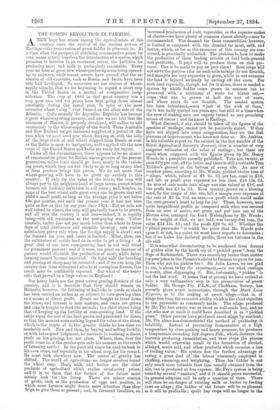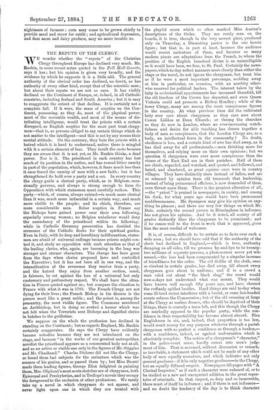THE COMING REVOLUTION IN FARMING.
ANEW hope has arisen, among the agriculturists of this country since the revival of the ancient system of Ensilage—the preservation of green fodder in pits—set in. At a time when the prospect of obtaining remunerative prices for corn seems utterly hopeless, the introduction of a system which promises to increase to an enormous extent the facilities for producing meat and milk is particularly seasonable. Every year we hear of great new wheat-producing areas being opened- up by railways, while recent events have proved that the re- sources of old countries, such as Russia and India, have been only half developed. So numerous are our sources of wheat- supply already, that we are beginning to regard a short crop in the United States as a matter of comparative insig- nificance. The crop of 1883 in that great country was a very poor one, and yet prices here kept going down almost constantly during the cereal year, in spite of the most extensive wheat "ring" ever formed on the other side of the Atlantic. Quite recently the Argentine Republic has become a great wheat-exporting country, and now we are told that the resources of Mexico, if properly developed, will suffice to add enormously to the wheat-supply of the world. From Australia and New Zealand we get increased supplies at a period of the year when we most need new wheat, keeping us, with the help of the large stock of old wheat shipped from Russia as soon as the Baltic is open to navigation, well supplied' till the new crops of the United States and India are ready for export.
Under all the circumstances, there appears to be no chance of remunerative prices for British wheat-growers of the present generation, unless rents should go down nearly to the vanish- ing point, which they are not likely to do so long as any kind of farm produce brings fair prices. We do not mean that wheat-growing will have to be given up entirely in this country. If only for the value of the straw, the crop will always pay in the neighbourhood of large towns, except where farmers are foolishly forbidden to sell straw ; and, besides, on some of the best wheat soils great crops can be grown that will yield a small profit so long as the average price is not below 40s. per quarter, and until the present year it had not been quite so low as that for any year since 1851. But on soils not well suited to wheat, the crop will gradually cease to be grown, and all over the country it will lose—indeed, it is rapidly losing—its old reputation as the rent-paying crop. Unfor- tunately, barley does not pay much better than wheat in these days of total abstinence and scientific brewing ; oats realise satisfactory prices only when the foreign supply is short ; and the demand for peas and beans is limited. What, then, can the cultivators of arable land do in order to get a living ? A great deal of our best corn-growing land is not well fitted for permanent pasture ; and if it were, too great an increase of pasture would diminish the production of meat, while dairy- farming cannot become universal. On light soils the breeding and grazing of sheep may be extended ; and if we can keep the country free from widespread attacks of contagious disease, this result .may be confidently expected. But what of the heavy soils that prevail to a large extent in England ?
Our heavy lands are the great winter grazing districts of the country, and it is desirable that they should remain so. Hitherto, however, the fattening of bullocks in yards or sheds has been carried on rather as an adjunct to corn-growing than as a means of direct profit. Beasts are bought to tread down the straw, and convert it into manure, and roots are grown and cake is bought to feed the animals ; the chief object being that of keeping up the fertility of corn-growing land. If the cattle repay the cost of the food grown and purchased for them, so that the manure costs nothing beyond the value of the straw, which is. thestaple of it, the grazier thinks he has done re- markably well. Now and then, by buying and selling luckily, or with extra-good judgment, he succeeds in realising a direct profit on his grazing, but not often. Where, then, does the profit come in, if the grazier gets only his manure as the result of fattening cattle ? In the good old times he used to look to his corn crops, and especially to his wheat crop, for his reward. He must look elsewhere now. The centre of gravity has shifted. The world of agriculture no longer revolves round the wheat crop. Meat, milk, and butter are the chief products of agriculture which realise satisfactory prices, and it is to them that the farmer of the future must mainly look for his living. There are minor sources of .profit, such as the production of eggs and poultry, to which most farmers might devote more attention than they deign to give them at present ; and, in favoured localities, an increased production of fruit, vegetables, or the superior makes of cheese—we have plenty of common cheese already—may be recommended. The demand for these commodities, however, is limited as compared with the demand for meat, milk, and butter, which, so far as the resources of this country are con- cerned, is practically unlimited. The problem is, how to make the production of these leading articles of food both general and profitable. It pays well to produce them on rich pas- tures. Can it be made to pay on poor clays ? Root crops will not serve the purpose ; for on such soils turnips do not flourish, and mangels are very expensive to grow, while in wet autumns the land is injured seriously by carting off the roots. For such land especially, though not for it alone, there is needed a system by which fodder crops grown in summer can be preserved with a minimum of waste for winter use,— crops that can be grown at half the cost of roots, and where roots do not flourish. The needed system has been introduced,—not "just at the nick of time," for it was badly wanted ten years ago, but still at a time when the eyes of sinking men are eagerly turned to any promising means of rescue ; and its name is Ensilage.
What discount, if any, should be taken off the figures of the apostles of ensilage, cannot yet be positively stated. If they have not slipped into some exaggeration, they are the first pioneers of improvement who have not done so. Mr. Jenkins, in his valuable report on the subject in the last number of the Royal Agricultural Society's Journal, cites a number of very sanguine estimates of the value of ensilage ; but these are small when compared with the figures given by Mr. Henry Woods in a pamphlet recently published. Take ten, twenty, or even fifty per cent, off the latter, and there is still a veritable Tom Tiddler's ground at the bottom of every silo. An acre of meadow grass, according to Mr. Woods, yielded twelve tons of "silage," which, valued at £1 6s. 8d. per ton, came to £16, and left as profit over expenses no less than £10 15s. 3d. An acre of oats made into silage was also valued at £16, and the profit was £9 is. 6d. Even spurrey, grown on a blowing sand, by the magic of the silo, left a margin over expenses at the rate of £4 4s. 10d. an acre,—a profit which would make the corn-grower's heart to leap for joy. These, however, were quite insignificant profits as compared with what was secured from an. acre of maize, cut green and put into one of the Merton silos, managed for Lord Walsingham by Mr. Woods ; for the weight of that, we are told, was twenty-five tons, the value £34 13s. 4d., and the profit £20 9s. 6d. Whether the "pitted provender" is worth the price that Mr. Woods puts upon it or not, is a point we must leave experts to determine ; but if we halve his declared profits, there are fortunes in the silo still.
It is somewhat discomforting to be awakened from dreams of golden silos by the harsh cry of "pickled grass ".from the Sage of Rothamsted. There was something better than matter for poor jokes in the Premier's advice to farmers to go in for jam. Then why not for pickles too ? Sir John Lawes, we are glad to see, is about to try the experiment,—to see what ensilage is worth, after disparaging it. But, fortunately, " pickles " is not the last word. It seems that at present we have arrived at only a very rudimentary step in the preservation of green fodder. Mr. George Fry, F.L.S., of Chobham, Surrey, has recently given exact instructions, through the Mark Lane Express, as to the making of sweet silage—that is, of silage free from the excessive acidity which is the chief objection to the provender as commonly made. The silage produced by Mr. Fry last season was as sweet as well-made hay, and no one who saw or smelt it could have described it as "pickled grass." Other persons have produced sweet silage by accident; Mr. Fry alone has demonstrated the method of producing it infallibly. Instead of preventing fermentation at a high temperature by close packing and heavy pressure, he produces a temperature exceeding 122 degrees Fah., which destroys the bacteria producing fermentation, and thus stops the process which would otherwise result in the formation of alcohol, aldehyd, acetic acid, and other products which occasion a loss of feeding value. His system has the further advantage of saving a great deal of the labour commonly employed in chaffing, ramming, and weighting. Thus his fodder is not only much more valuable than thai, usually obtained from the silo, but is produced at less expense. Mr. Fry's system is beings tested by several " ensilors," and if it should prove successful, its general adoption will be only a question of time. There will then be no danger of tainting milk or batter by feeding cows on silage ; the fodder of the future will be as pleasant as it will be profitable ; spoilt hay crops will no longer be the
nightmare of farmers ; corn may come to be grown chiefly to provide meal and straw for cattle ; and agricultural depression, and dear meat and dairy produ3e, may no more trouble us.

































 Previous page
Previous page